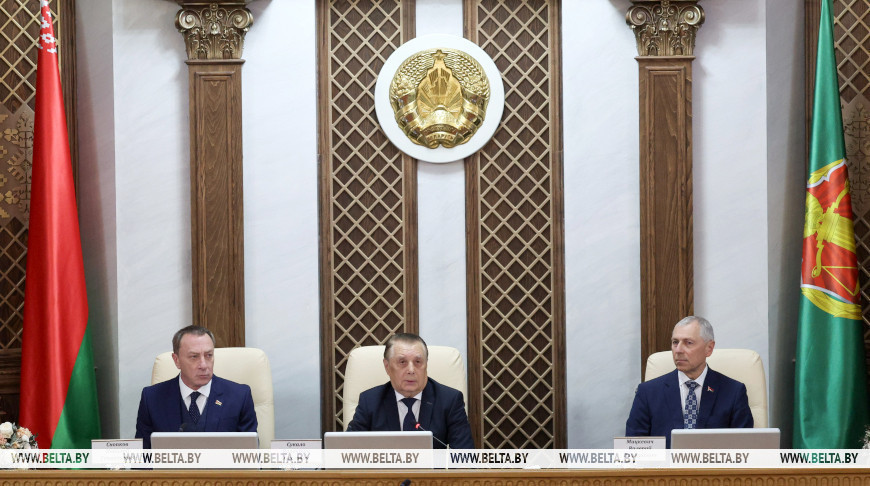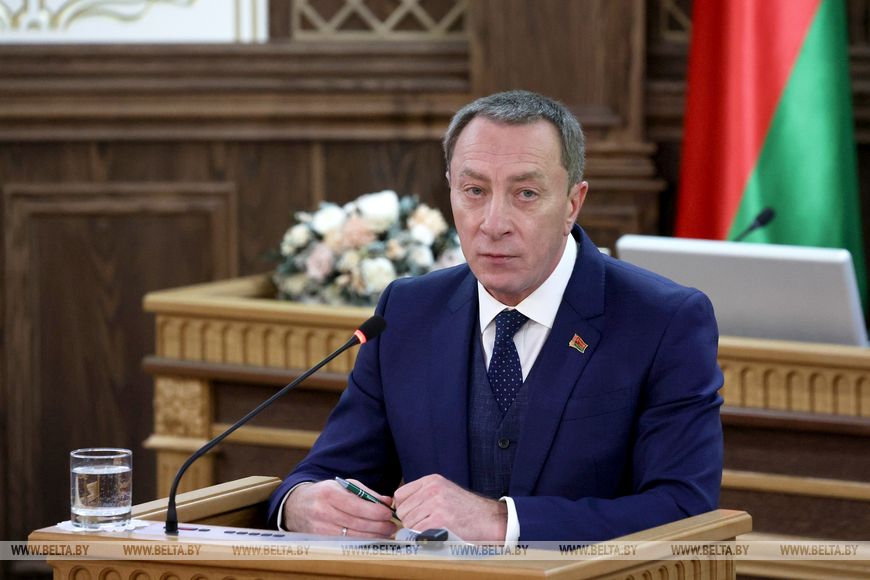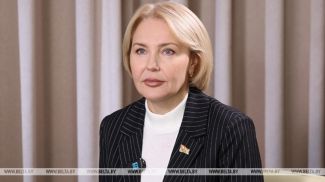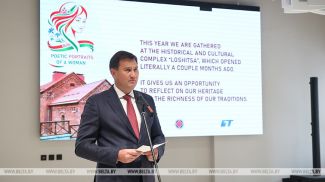
MINSK, 30 May (BelTA) – The concept of the 2026-2030 Socioeconomic Development Program has been presented to the Supreme Court of Belarus, BelTA has learned.
Speaking to the judicial community, First Deputy Prime Minister Nikolai Snopkov noted that the five-year Socioeconomic Development Program sets the tasks for the domestic economy and defines the tools to implement them relying on the experience of the previous five-year period.

The new document is based on the instructions the head of state gave during campaigning and while appointing the government. It is also based on public needs (established during a large-scale sociological survey) and proposals of the academic community.
Speaking about the medium-term objectives, the first deputy prime minister named five areas that will shape the country’s future.
The development of human potential will be in the focus. There are plans to reverse demographic trends and adjust education to the future needs of the economy. According to Nikolai Snopkov, all the tools stipulated by the program are directly or indirectly aimed at achieving higher living standards.
The family support system will be revised. Additional tools to encourage people to have more babies were proposed. The number of free IVF cycles will increase to two. The family capital program will be extended.
Kindergartens are proposed to work flexible hours and accept more children under two years old. According to the first deputy prime minister, these proposals will be discussed in greater detail while finalizing the program.
Speaking to the judicial community, First Deputy Prime Minister Nikolai Snopkov noted that the five-year Socioeconomic Development Program sets the tasks for the domestic economy and defines the tools to implement them relying on the experience of the previous five-year period.

The new document is based on the instructions the head of state gave during campaigning and while appointing the government. It is also based on public needs (established during a large-scale sociological survey) and proposals of the academic community.
Speaking about the medium-term objectives, the first deputy prime minister named five areas that will shape the country’s future.
The development of human potential will be in the focus. There are plans to reverse demographic trends and adjust education to the future needs of the economy. According to Nikolai Snopkov, all the tools stipulated by the program are directly or indirectly aimed at achieving higher living standards.
The family support system will be revised. Additional tools to encourage people to have more babies were proposed. The number of free IVF cycles will increase to two. The family capital program will be extended.
Kindergartens are proposed to work flexible hours and accept more children under two years old. According to the first deputy prime minister, these proposals will be discussed in greater detail while finalizing the program.
Accessibility, quality and digitalization are key tasks for healthcare. At least three inter-district high-tech healthcare centers will operate in each region. A single electronic patient database will be launched to simplify the transfer of people from one medical institution to another: documents will be transferred upon request from institution to institution.
Women on maternity leave will be encouraged to return to work prematurely as restrictions on their maternity allowance will be lifted, said Nikolai Snopkov.
According to the first deputy prime minister, pensioners working after retirement will be able to simultaneously receive salaries and full pensions. Highly qualified and skilled workers will be invited to come to Belarus and the responsibility of employers for foreign staff will be increased.
According to Nikolai Snopkov, the infrastructural improvements envisaged by the program seek to raise the quality of life even the most remote communities. In general, over Br20 billion will be spent to build more than 650 infrastructure facilities throughout the country. Transport links between the regions will improve. More than 25,000 km of roads will be built and repaired; about Br13 billion will be invested in road infrastructure.
High-speed road links ‘agro-town - district center - oblast center’ will be created. For example, travel time from Minsk to any satellite town will take up to 30 minutes, travel time from populated areas to the nearest oblast center will take no more than 1-1.5 hours.
Another task is providing the population with affordable rental housing. About 5 million m2 of such housing is to be built. The total funding will amount to Br13.5 billion. According to the first deputy prime minister, this will contribute to personnel retainment in the regions. The principle is simple: join an enterprise – get accommodation.
The government will keep subsidizing housing construction for families raising many children, as well as for orphans and other vulnerable population groups.
A higher standard of living is another target. Nikolai Snopkov cited the quality of mobile communications as an example. “The focus will be not on coverage, but on speed,” he said. According to him, the Internet speed will increase noticeably by 2030.
“The service sector remains a crucial driver of economic growth. In this regard, the tourism industry holds a lot of potential. External demand for Belarusian services is constantly growing.
“Institutionally, we will improve the management system by raising the status of the National Tourism Agency. We will create about 70 local tourism information centers. The goal is to more than double the share of the tourism sector in GDP over the five-year period,” said Nikolai Snopkov.
According to him, the plan for the next five years provides for the development of at least 2,000 models and modifications of mechanical engineering products by 2030. They will include a hybrid dump truck and a dump truck with an electric traction drive powered by hydrogen, a 70-tonne quarry grader, a grain harvester with a hybrid threshing and separating device.
As far as the energy sector is concerned, it is planned to build at least 10 digital power substations and install smart power grids.
Regional development is the core of the Socioeconomic Development Program, the first deputy prime minister emphasized. Intra-regional agglomerations will be formed. Such agglomerations will consist of economic complexes of several districts and cities that will be connected by transport infrastructure and economic chains. There are 21 such complexes in the country. Each agglomeration has its own core, which is either the capital city, or the oblast center, or a city with a population of over 80,000.
There are plans to support small and medium-sized businesses in areas adjacent to such agglomerations, as well as in satellite towns and in settlements with a population of up to 20,000. Such projects already exist within the framework of the Regional Initiative. This is the continuation of the One District - One Project initiative.
Particular emphasis will be placed on the Minsk Industrial Belt, the Pripyat Polesie area, and the southeast of Mogilev Oblast. These are potential sites for industrial localization and testing of new preferential regimes for investors.
Agriculture remains an important economic driver for regions. It is necessary is to substantially improve managerial practices at agricultural enterprises and pull struggling companies off the brink of bankruptcy.
The next task has to do with environmental protection and rational use of natural resources. Here, the potential for economic growth lies in waste recycling. The target is to recycle up to 70% of waste and introduce a ‘zero waste’ system, to embrace rational consumption and production practices. The share of state-owned enterprises with eco-friendly manufacturing technologies should be at least 70%.
The key goal of the five-year plan is to ensure social stability and balanced economic growth, concluded Nikolai Snopkov.
Speaking to journalists, Chairman of the Supreme Court Valentin Sukalo noted that the program is to be discussed at the Belarusian People's Congress. Today's meeting with the first deputy prime minister will allow the judicial community to better understand how they can help implement this program.
According to the first deputy prime minister, pensioners working after retirement will be able to simultaneously receive salaries and full pensions. Highly qualified and skilled workers will be invited to come to Belarus and the responsibility of employers for foreign staff will be increased.
According to Nikolai Snopkov, the infrastructural improvements envisaged by the program seek to raise the quality of life even the most remote communities. In general, over Br20 billion will be spent to build more than 650 infrastructure facilities throughout the country. Transport links between the regions will improve. More than 25,000 km of roads will be built and repaired; about Br13 billion will be invested in road infrastructure.
High-speed road links ‘agro-town - district center - oblast center’ will be created. For example, travel time from Minsk to any satellite town will take up to 30 minutes, travel time from populated areas to the nearest oblast center will take no more than 1-1.5 hours.
Another task is providing the population with affordable rental housing. About 5 million m2 of such housing is to be built. The total funding will amount to Br13.5 billion. According to the first deputy prime minister, this will contribute to personnel retainment in the regions. The principle is simple: join an enterprise – get accommodation.
The government will keep subsidizing housing construction for families raising many children, as well as for orphans and other vulnerable population groups.
A higher standard of living is another target. Nikolai Snopkov cited the quality of mobile communications as an example. “The focus will be not on coverage, but on speed,” he said. According to him, the Internet speed will increase noticeably by 2030.
“The service sector remains a crucial driver of economic growth. In this regard, the tourism industry holds a lot of potential. External demand for Belarusian services is constantly growing.
“Institutionally, we will improve the management system by raising the status of the National Tourism Agency. We will create about 70 local tourism information centers. The goal is to more than double the share of the tourism sector in GDP over the five-year period,” said Nikolai Snopkov.
According to him, the plan for the next five years provides for the development of at least 2,000 models and modifications of mechanical engineering products by 2030. They will include a hybrid dump truck and a dump truck with an electric traction drive powered by hydrogen, a 70-tonne quarry grader, a grain harvester with a hybrid threshing and separating device.
As far as the energy sector is concerned, it is planned to build at least 10 digital power substations and install smart power grids.
Regional development is the core of the Socioeconomic Development Program, the first deputy prime minister emphasized. Intra-regional agglomerations will be formed. Such agglomerations will consist of economic complexes of several districts and cities that will be connected by transport infrastructure and economic chains. There are 21 such complexes in the country. Each agglomeration has its own core, which is either the capital city, or the oblast center, or a city with a population of over 80,000.
There are plans to support small and medium-sized businesses in areas adjacent to such agglomerations, as well as in satellite towns and in settlements with a population of up to 20,000. Such projects already exist within the framework of the Regional Initiative. This is the continuation of the One District - One Project initiative.
Particular emphasis will be placed on the Minsk Industrial Belt, the Pripyat Polesie area, and the southeast of Mogilev Oblast. These are potential sites for industrial localization and testing of new preferential regimes for investors.
Agriculture remains an important economic driver for regions. It is necessary is to substantially improve managerial practices at agricultural enterprises and pull struggling companies off the brink of bankruptcy.
The next task has to do with environmental protection and rational use of natural resources. Here, the potential for economic growth lies in waste recycling. The target is to recycle up to 70% of waste and introduce a ‘zero waste’ system, to embrace rational consumption and production practices. The share of state-owned enterprises with eco-friendly manufacturing technologies should be at least 70%.
The key goal of the five-year plan is to ensure social stability and balanced economic growth, concluded Nikolai Snopkov.
Speaking to journalists, Chairman of the Supreme Court Valentin Sukalo noted that the program is to be discussed at the Belarusian People's Congress. Today's meeting with the first deputy prime minister will allow the judicial community to better understand how they can help implement this program.













